|
|
|
Flys In the Hood
Ten Seattle filmmakers take the ultimate SIFF challenge
The Fly Filmmaking Challenge has become one of the most entertaining and unpredictable programs of the Seattle International Film Festival. The challenge is this: several local filmmakers are picked by SIFF programmers. The lucky bunch is then asked to pick a random word out of a hat and make a documentary-style film about it. The filmmakers are donated services and equipment and asked to shoot their piece de resistance in no more than five days. The final film must be under five minutes and relate to the chosen word; this year the words are Seattle neighborhoods.
Tablet was lucky enough to sit down with this year’s challengers—including this year’s special guest Fly Filmmaker, Clay Edie—and ask them about their process, the program, their inspiration and what it was like to be a fly in the hood.
—Edited by Karla Esquivel with Kristopher Monroe and Ty Garfield |
|
Ann Coppel
Queen Anne
Whether Coppel is working on a documentary or a narrative, it’s important for her characters to have a voice and for the imagery to just as compelling as the story. Her film credits include “Speaking for Ourselves: Portraits of Gay and Lesbian Youth” and the independent feature ”Crocodile Tears.” Her film “Sperm Hunt” was a finalist at Sundance and placed 4th in the national screenplay competition in 1999. Her most recent work is a documentary about songwriter Debbie Friedman entitled “Journey of Spirit.” |
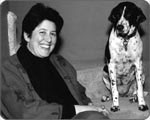 |
Did you find it difficult or easy to create a film based on a random word?
As it turns out, the words I picked couldn’t have been more perfect. My name is Ann, after all. So for me, that was perhaps the greatest moment of my Fly experience. The word actually made it easy for me to pursue a story idea I’ve had for a while. It was not what I expected, to be able to realize that dream on this assignment.
|
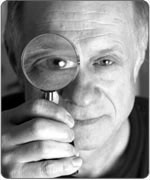
|
Lars Larson
Capitol Hill
Larson has worked for years in almost every aspect of filmmaking and has played in various funk-jazz bands dating back through the mid-‘70s. He is the oldest and probably the most experienced of the Fly Filmmakers. This is his directorial debut.
What is the most common mistake you see in less experienced filmmakers?
Not being prepared and not having a script that works. Filmmaking is the ultimate collaborative experience. It’s not like a garage band where you can just go in and riff. With film it’s all intentional. You can’t always improvise as much. |
Wes Kim
Fremont As a person who seems to keep himself constantly busy with a multitude of film projects, Kim is the writer/director of the award-winning short films “Profiles in Science” and “Vision Test.” He is also a co-director of the film series Sneak Films and the director of the Northwest Asian American Film Festival. He enjoys creating humorous and conceptual pieces with very little means. Perhaps most importantly, Kim was the recipient of Tablet’s prestigious 2003 Pretty Good Award. |
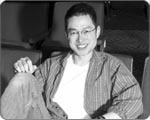 |
Your neighborhood has undergone major changes over the years. Was that an inspiration for you?
My film initially focused on a specific piece of public art but grew to encompass a number of larger issues that face both Fremont and the region as a whole. The neighborhood has gone through dramatic changes in the last several years, and your take on those changes depends a lot upon your individual history and place in the city—how long you’ve lived here, your profession, your level of neighborhood involvement, and so on. The funny thing is, there are new arrivals to this city every day, and their sense of Fremont is based on what it looks like the moment they arrive, not what it looked like ten years ago.
|
Kathlyn Albright
Georgetown At 36, Albright believes this is her year to be sassy. She has worked in the film industry in Seattle since her move here in 1986. Her film credits include the semi-autobiographical “My Way is Right,” and most recently she has produced “bodyBODY: Aphrodite Raves,” a multi-media show exploring women’s body image issues. She is acting as Program Director for Viva Wilde’s Sex on Screen Film Festival. What is the most interesting characteristic you learned about your neighborhood?
It’s a beautiful place, in a strange way. The visual landscape is very rich, as is the soundscape. One of the people I interviewed for the film told me that they had the kind of small town community in Georgetown that most people in cities only ever dream of having. This same person no longer lives there because of the noise. I ran across that all the time making the film—it’s a fantastic place with really big problems, and these people are kind of left on their own trying to solve them. But they are trying to solve them, whether the rest of the city helps them or not.
|
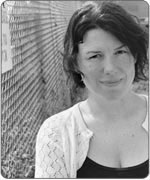 |
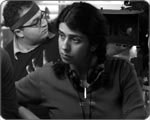 |
Ladan Yalzadeh
Beacon Hill
A recent attendee at the American Film Institute’s Director Workshop for Women, Yalzadeh recently completed filming of “The Florist,” a project she wrote and directed.
|
In your most recent project, “The Florist,” the protagonist exemplifies the empowered, passionate woman in the face of social and cultural adversity. Was that an intentional statement on your part?
Actually, it was much less philosophical than that. Within my own life experiences, I was exposed to the dramas of political turmoil [in Iran]. At the heart of the film lies conflicts: political, familial, and issues of coming of age. I felt a personal connection to the whole piece of storytelling.
|
David Russo
West Seattle Named one of “Filmmaker Magazine’s” 25 New Faces of Indie Film in 2003, Russo’s work stretches the limits of the imagination by incorporating animation and a strong artistic ethic. Both “Populi” and his most recent film “Pan With Us,” have premiered at festivals all over the world. He made a quasi-protest piece about the Fly program at SIFF. Since you are mostly known for your art films and animation, what possessed you to take on the documentary style of the Fly Film Challenge?
I don’t like documentaries, I HATE short documentaries, I don’t work or sell my work for free, and I don’t believe in restricting content with control-for-control’s-sake regulations. These are all things that the Fly Film program does and prides itself in. By being a part of Fly, I was hoping to call into question that dubious kind of “support for the filmmaking community.” The fact is that the program takes far more from the filmmakers than it gives. What better way to try to effect change than to participate? Little did I understand going in just how much of a fly they would regard me as. |
Brian McDonald
Belltown McDonald started his work in the film industry at the age of 15 as an assistant cameraman, which explains why his films are shot with such finesse. His short mocumentary, “White Face,” about the hazards of clown racism, is downright hilarious. His latest feature “Inheritance,” is now drawing attention from major distribution companies. McDonald’s Fly Film takes a look at the people who miss the old UA 150 movie theatre that used to be at 6th and Blanchard.
|
 |
Have you always been interested in making a film about the old UA movie theater?
No, not really. But when it was demolished, I did think it didn’t get the send-off it deserved. It was an unofficial cultural landmark so it was nice to be able to preserve that place in some way.
|
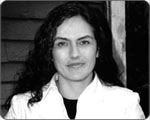 |
Heather Ayres
Ballard
Heather Renee Ayres is a Seattle writer and director.
Her short documentary "Sharing the Sheets" was part of
911 Media Art Center's 2002 New Voices program and
screened at the 2003 Seattle Lesbian & Gay Film
Festival and aired on KCTS. Her short script "101
Days" won the 2001 DigiFest Southwest script contest
with all expenses paid to produce the film in New
Mexico. It will air this summer on The American Avant
Garde, a new Seattle film series. She is currently
working on a documentary feature, a short film and two
feature scripts. She is also a board member of 911
Media Arts Center.
What aspect of the city inspired your short?
I walked around Ballard Avenue - it had a cool vibe,
while NW Market still had a very middle-America feel.
I found myself asking what Ballard needed, what it was
missing, and with that feeling created the short film. |
Jordan Parhad
International District
With credits on films such as “Book of Stars,” “Life or Something Like It,” and “The Ring” (2002), Parhad finds his true passion in fiction filmmaking. However, he enjoyed the challenge of working on his Fly film. How do you balance the vision of a filmmaker with the occasionally grim realities of documentary cinema verité?
As a director, you have an idealized vision of what a particular scene or interview will be like, and that whets your appetite. But, if an interview doesn’t go well, don’t be horrified with what you didn’t get. Follow that to the next part of the story. Your story will unfold as you find it.
|
| |
|
|
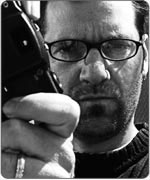 |
Clay Edie
Neighborhood: Seattle
Renown for his multi-award winning feature film “Dead Dogs,” Edie is beginning production on “Cowboy Angst,” an adaptation of Jasen Emmons’ novel.
What does your internal barometer tell you about taking risks with your work in regards to the audience’s reception?
I trust my instincts. Often, I don’t really work with the audience in mind. I look for material I connect with. If I am moved by a piece of work I imagine an audience will react as well. |
|
|
|
|
All content of Tablet is © 2005 by Tablet, LLC and may not be reprinted without expressed written permission.
|